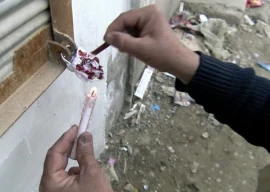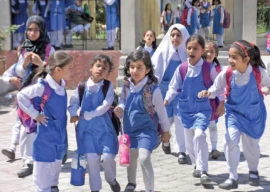
A draft resolution on peace recommendations for India and Pakistan through trade and other measures were presented by former ambassador Sherry Rehman at Jinnah Institute’s 3rd Islamabad Dialogue which concluded on Friday.
As the two day Islamabad Dialogue came to an end, a number of Indian analysts and Pakistani experts on the region united for a successful dialogue.
At the event, President Jinnah Institute Sherry Rehman said, “We need to give leverage to democracy in both counties – such steps ensure sustained development.”
According to the joint statement, Pakistan should consider allowing overland transit through the Wagha-Attari border for trade between India and Afghanistan.
Moreover, experts were of the view that both security establishments must engage to share their perceptions on Afghanistan and should take each other into confidence regarding their concerns about post-2014 Afghanistan.
Secondly, it was recommended that intelligence sharing should be done at the highest level, keeping in view the common threat from terrorism.

Other issues such as human rights concerns in Kashmir, arrests of fishermen, prisoners of war and other prisoners also came under discussion.
The resolution stipulated a “no arrests of fishermen” policy and asked for the establishment of marine risk reduction centres with the ability to communicate with each other. The lack of a maritime boundary was identified as a fundamental obstacle to resolving the issue.
On the issue of Kashmir, participants stressed on the need to commit to implementing confidence-building measures on trade and travel related to Kashmir and bilateral discussions must be kept
There was also an increased emphasis on facilitating travel by catering to an increasing number of entry points on land routes.
Murder of prisoners
The panel roundly condemned the recent tit-for-tat murders of prisoners and called on the two governments to make efforts to prevent such incidents from being repeated. “For the first time we spoke about prisoners,” Sushobha Barve, an Indian panelist, told The Express Tribune. “It is a step by step process and we can do it!”
Speaking to The Express Tribune, Kavita Srivastava, an activist working on Pakistani prisoners in Indian jails said prisoners should not be allowed to be the target of politics.
Jatin Desai, journalist and peace activist working with fishermen told The Express Tribune, we saw hope and expectations during and even after the elections. “The world is moving and scenario of violence is what the people are fed up of,” he said.
The Islamabad Dialogue III was the result of collaboration between the Jinnah Institute and New Delhi’s Center for Dialogue and Reconciliation. The conference was being held for the third consecutive year, and continued in its aim to promote peace between Pakistan and India through Track II diplomacy.
Published in The Express Tribune, July 6th, 2013.
COMMENTS (14)
Comments are moderated and generally will be posted if they are on-topic and not abusive.
For more information, please see our Comments FAQ
1672385156-0/Andrew-Tate-(1)1672385156-0-405x300.webp)
















@Mohan: "india Vs Pakistan peace is never going to happen, unless there is secular democracy, freedom of expression, rule of law, equal opportunity for “all sections” of Pakistan." Even then peace is not going to take place unless India revises its policy of coercion and domination and gives freedom to Kashmir. And, if these latter things happen India-Pakistan peace is likely possible without the foregoing conditions.
india Vs Pakistan peace is never going to happen, unless there is secular democracy, freedom of expression, rule of law, equal opportunity for "all sections" of Pakistan. How likely it is to happen?
The non-State actors which Pakistan is trying to control but yet cannot control and which have attacked Pakistan Army and defense posts and installations should not be taken as “creating, nurturing, training and pushing terrorists to India to commit barbaric terror attacks such as 26/11 Mumbai attack.” This has been used as an excuse by India to follow a policy of coercive diplomacy and thus India has: “managed to keep the confrontation alive.” Besides, India has home-grown terrorists, which itself cannot control. By denying freedom to Kashmir, India is also creating freedom fighters which India likes to term as terrorists. And, India falsely blames Pakistan for sending "jihadis" to Kashmir although Pakistan tacitly cooperated in giving India a free hand to build a barbed wire fence in the part of Kashmir that India controls. Musharraf's appeasement of India has whetted its appetite for a policy of domination and coercive diplomacy.
@Darioush:
"Pandering to the India won’t do us any good. It’s been tried before, but has never worked."
By "pandering", if you mean creating, nurturing, training and pushing terrorists to India to commit barbaric terror attacks such as 26/11 Mumbai attack, it has indeed worked. It has managed to keep the confrontation alive.
IS IT COMPOSITE ""DIALIGUE" A country which prefer China than India and ready to establish streategic relation with a super power of Asia and deliberatly do'nt want to see India as regional power how she can play a role of pivote for peace and prosperity . In fact just like China we should only concentrate on win- Win economic relation first there after when Pakistan will taste the Chineese dish and get saturated as happened with western dish ,it is only then composite dialogue may yeiled some desired results . So don't be in hurry . Our relation will evolve and can't be constructed as some Indian experts are expecting .
@Darioush: Agreed. Confidence Building Measures (CBM's) have usually benefited India more than Pakistan. Examples: Division of the Muslim Majority Punjab and Bengal did not earn India's goodwill. Even the Gurdaspur District of Muslim Majority Punjab was given to India to provide it with an overland route to Kashmir. Ceasefire over Kashmir with the hope of a free plebiscite only gave India a chance to strengthen its stranglehold over the disputed princely state. The Indus Basin Treaty (1960) has not guaranteed fair share of water from Jhelum where India has built Wuler Barrage or from Chenab where India builds the Baglihar dam. India intervened in Pakistan's Civil War to forcibly break-up Pakistan in 1971.
A "liberal" propaganda institute?
@Kamran Choudhry: "Whereas Pakistani agricultural, surgical and textile goods will have better chance of success in India and India’s vast growing economy can easily absorb Pakistani exports and even improve lives of Indian lower middle class." Which agricultural products do you have in mind? Surgical goods, maybe. Textile goods: India is far ahead and India's textile goods are going to create a deluge and is likely to cause severe trade imbalances. Even our agriculture is no competition with India and we do not even stand a chance of a vertical trade relationship with India providing finished goods and we providing them with basic staple/raw materials/agricultural products. Selective trade that does NOT create severe trade and payments imbalance might be a good idea.
Sherry needed a job and a prominent position after resigning as ambassador to US.
After enjoying themselves over food and drinks for a few days is this limp declaration all they could come up with ? Who is funding these jokers, I hope it is not Tax payers.
"Pakistan should consider allowing overland transit through the Wagha-Attari border for trade between India and Afghanistan". So that India should supply weapons to Afghanistan to be used against Pakistan to destabilize it. Sherry. please don't act like indian ambassador in Pakistan just like Hussain Haqqani was in US.
Can ET provide us with a list of Pakistani experts at Jinnah Institute?
If we want better economy and avoid painful external debt like the one we signed with the International Monetary Fund (IMF), we must establish practical win-win trade relationship with India. Both countries need products from each other to strengthen their economies. China is our fierce competitor in trade and does not need Pakistani products which may severely affect the Chinese small and middle size manufacturers. Whereas Pakistani agricultural, surgical and textile goods will have better chance of success in India and India's vast growing economy can easily absorb Pakistani exports and even improve lives of Indian lower middle class.What is needed a political will on the parts of our leaders and a paradigm shift by our military and elitists considering India not as a foe but a friend. From the day of partition we in Pakistan have held ourselves hostage to our anti-India mindset and in the process starving ourselves. May be the new Prime Minister will also make, as with China, the Pakistan-India relationship "as sweet as honey".
Pandering to the India won't do us any good. It's been tried before, but has never worked.